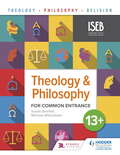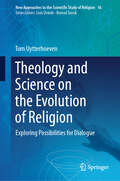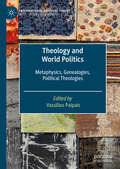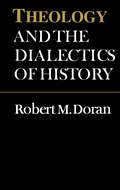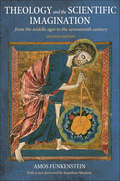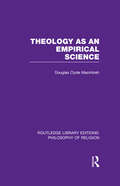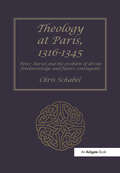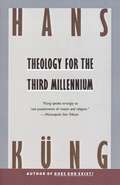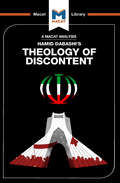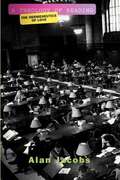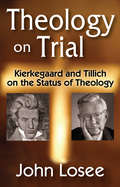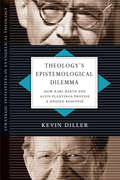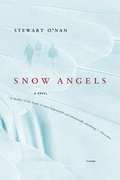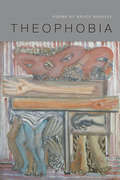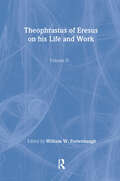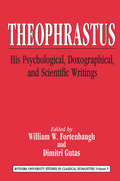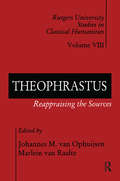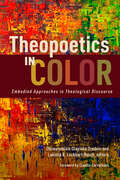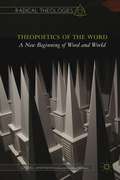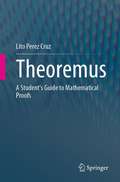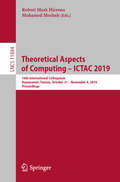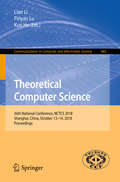- Table View
- List View
Theology and Marxism in Eagleton and Žižek: A Conspiracy of Hope
by Ola SigurdsonTaking its cue from the renewed interest in theology among Marxist and politically radical philosophers or thinkers, this study inquires into the reasons for this interest in theology focusing on the British literary theorist Terry Eagleton and the Slovenian philosopher and psychoanalyst Slavoj Žižek, as two contemporary prominent Marxist thinkers.
Theology and Philosophy for Common Entrance 13+
by Michael Wilcockson Susan GrenfellTrust the experts; let Religious Studies specialists Susan Grenfell and Michael Wilcockson guide you through the new Theology and Philosophy content of the ISEB Theology, Philosophy and Religion syllabus for Common Entrance 13+.- Enables students to develop and review their knowledge through discussion points and a variety of activities designed to encourage active research and engagement- Builds the skills that students need for the exam by providing questions that focus on the three assessment objectives- Boosts students' confidence approaching assessment with exam-style practice questions at the end of each section- Guides you though the new - and potentially challenging - syllabus content with clear coverage of the philosophical and ethical materialThis Student Book is fully supported by the accompanying Teacher Resource Book, which contains helpful Teachers' Overviews for each chapter, guidance on delivering the content and classroom-ready worksheets.
Theology and Philosophy for Common Entrance 13+
by Michael Wilcockson Susan GrenfellTrust the experts; let Religious Studies specialists Susan Grenfell and Michael Wilcockson guide you through the new Theology and Philosophy content of the ISEB Theology, Philosophy and Religion syllabus for Common Entrance 13+.- Enables students to develop and review their knowledge through discussion points and a variety of activities designed to encourage active research and engagement- Builds the skills that students need for the exam by providing questions that focus on the three assessment objectives- Boosts students' confidence approaching assessment with exam-style practice questions at the end of each section- Guides you though the new - and potentially challenging - syllabus content with clear coverage of the philosophical and ethical materialThis Student Book is fully supported by the accompanying Teacher Resource Book, which contains helpful Teachers' Overviews for each chapter, guidance on delivering the content and classroom-ready worksheets.
Theology and Science on the Evolution of Religion: Exploring Possibilities for Dialogue (New Approaches to the Scientific Study of Religion #16)
by Tom UytterhoevenThis book studies the much-debated implications of sociobiology for religion. It explores the answers to questions such as: Is religion merely the result of natural selection? Do religious ideas literally make up people's minds, determining how they think and act? Critically engaging philosopher Daniel Dennett's view on cultural evolution, the book argues that the relation between religious concepts and religious believers is one of continuous, creative dialogue. This dialogical relation allows meaning to emerge and leaves room for free will, thus contradicting Dennett's position. The book provides a concise introduction to the questions at play where religion and science meet. Drawing on sources from science, philosophy and theology, it offers an example of how a constructive interaction of different disciplines can lead to new perspectives on the complex phenomenon of religion.
Theology and World Politics: Metaphysics, Genealogies, Political Theologies (International Political Theory)
by Vassilios PaipaisSituated within the wider post-secular turn in politics and international relations, this volume focuses not on religion per se, but rather explicitly on theology. Contributions to this collection highlight the political theological foundations of international theory and world politics, recasting theology and politics as symbiotic discourses with all the risks, promises and open questions this relation may involve. The overarching claim the book makes is that all politics has theology embedded in it, both in the genealogical sense of carrying ineradicable traces of rival theological traditions, and also in the more ontological sense of being enacted by alternative configurations of the theologico-political. The book is unique in bringing together a diverse group of scholars, spanning knowledge areas as varied as IR, political theory, philosophy, theology, and history to investigate the complex interconnections between theology and world politics. It will be of interest to students and scholars of political theory, international relations, intellectual history, and political theology.
Theology and the Dialectics of History
by Robert Doran, S.J.In this challenging work Robert M. Doran explores the basis of systematic theology in consciousness, and goes on to consider the practical role of such theology in establishing and fostering communities with an authentic way of life. This way of life would counteract the distortions and deformations of humanity that are exemplified by both late capitalism and Marxism. Theology positions and interpretations today, argues Doran, must be stated in the categories of a theory of history. The first part of the book outlines the horizon required for such categories. The second,, third, and fourth parts incrementally derive the categories expressing a theory of history in terms of the reciprocal relations among subjects, cultures, and social structures. The final part, on hermeneutics, oresents an argument for the pertinence of what has preceded for interpreting the words and deeds of others. Doran draws extensively on the thought of Bernard Lonergan, and the work develops Lonergan's methodological insights. It issues a call to persona; genuineness and authenticity, informed by religious, moral, intellectual, affective, and psychic 'conversions,' by 'interior' differentiation of one's consciousness, and by Christian faith, on the parts of theologians who aspire to arrest effectively the course of cultural decline.
Theology and the Scientific Imagination: From the Middle Ages to the Seventeenth Century
by Amos FunkensteinTheology and the Scientific Imagination is a pioneering work of intellectual history that transformed our understanding of the relationship between Christian theology and the development of science. Distinguished scholar Amos Funkenstein explores the metaphysical foundations of modern science and shows how, by the 1600s, theological and scientific thinking had become almost one. Major figures like Descartes, Leibniz, Newton, and others developed an unprecedented secular theology whose debt to medieval and scholastic thought shaped the trajectory of the scientific revolution. The book ends with Funkenstein’s influential analysis of the seventeenth century’s “unprecedented fusion” of scientific and religious language. Featuring a new foreword, Theology and the Scientific Imagination is a pathbreaking and classic work that remains a fundamental resource for historians and philosophers of science.
Theology as an Empirical Science (Routledge Library Editions: Philosophy of Religion)
by Douglas Clyde MacintoshInvestigating the question ‘can theology, description of the divine reality, be made truly scientific?’, this book addresses logic and human knowledge alongside experimental religion. An important philosophic work by a prolific theologian also known for his later court case regarding conscientious objection, this book describes how it is possible to relate theological theory with religious experience of the divine the way that the sciences relate to human acquaintance with things and people in social experience.
Theology at Paris, 1316–1345: Peter Auriol and the Problem of Divine Foreknowledge and Future Contingents (Ashgate Studies in Medieval Philosophy)
by Chris SchabelChris Schabel presents a detailed analysis of the radical solution given by the Franciscan Peter Auriol to the problem of reconciling divine foreknowledge with the contingency of the future, and of contemporary reactions to it. Auriol's solution appeared to many of his contemporaries to deny God's knowledge of the future altogether, and so it provoked intense and long-lasting controversy; Schabel is the first to examine in detail the philosophical and theological background to Auriol's discussion, and to provide a full analysis of Auriol's own writings on the question and the immediate reactions to them. This book sheds new light both on one of the central philosophical debates of the Middle Ages, and on theology and philosophy at the University of Paris in the first half of the 14th century, a period of Parisian intellectual life which has been largely neglected until now.
Theology for the Third Millennium: An Ecumenical View
by Hans KungThis illuminating historical and theological argument is an essential work for anyone wishing to understand the major changes that are inexorably altering the face of modern world religions.
Theology of Discontent: The Ideological Foundation of the Islamic Revolution in Iran
by Bryan Gibson Magdalena C. DelgadoHamid Dabashi’s 1997 work Theology of Discontent reveals a creative thinker capable not only of understanding how an argument is built, but also of redefining old issues in new ways. The Iranian Revolution of 1978–9 was front-page news in the West, and in some ways remains so today. Though it was an uprising against authoritarian royal rule, with a coalition of modernisers and Islamists, the revolution saw the birth of a new Islamic Republic that seemed to reject pro-Western democracy. Dabashi wanted to analyze the real reasons for this change, while examining how Islamic ideologies contributed to the revolution and the republic that followed. Theology of Discontent examines different Islamic thinkers, analyzing how views with seemingly little in common contributed to the modern Iranian belief system. Beyond its insightful analytical dissection of these eight thinkers, Theology of Discontent also shows Dabashi’s creative thinking skills. Reframing the debates about Iran’s relationship with the West, he traced the ways in which Iranian identity formed in reactive opposition to Western ideas. In many ways, Dabashi suggested, Iran was trapped in a cycle of deliberately asserting its difference from the West, a process that was fundamental to the development of its own unique brand of revolutionary Islamism.
Theology of Reading: The Hermeneutics of Love
by Alan JacobsIf the whole of the Christian life is to be governed by the "law of love"-the twofold love of God and one's neighbor-what might it mean to read lovingly? That is the question that drives this unique book. Jacobs pursues this challenging task by alternating largely theoretical, theological chapters-drawing above all on Augustine and Mikhail Bakhtin-with interludes that investigate particular readers (some real, some fictional) in the act of reading. Among the authors considered are Shakespeare, Cervantes, Nabakov, Nicholson Baker, George Eliot, W. H. Auden, and Dickens. The theoretical framework is elaborated in the main chapters, while various counterfeits of or substitutes for genuinely charitable interpretation are considered in the interludes, which progressively close in on that rare creature, the loving reader. Through this doubled method of investigation, Jacobs tries to show how difficult it is to read charitably-even should one wish to, which, of course, few of us do. And precisely because the prospect of reading in such a manner is so offputting, one of the covert goals of the book is to make it seem both more plausible and more attractive.
Theology on Trial: Kierkegaard and Tillich on the Status of Theology
by John LoseeSoren Kierkegaard sought to clarify what it means to be a Christian. He concluded that a one-on-one relationship with God is required, to encounter the "Absolute Paradox," defined as an immutable being entering into and transforming human history. Kierkegaard's dim view of a systematic Christian theology includes a preoccupation with theological exposition that distracts from the essential task of achieving a personal relationship with Jesus Christ. Alternatively, Paul Tillich's theology is based on a triadic relationship of being, nonbeing and Being-Itself (God), a doctrine of symbols, and a reinterpretation of the Incarnation. It correlates a culture's questions and concerns with the Christian message to certain criteria of acceptability that, to Tillich, must satisfy the "Protestant Principle," stipulating that a theological system both restates the present-time Christian message and acknowledges that this restatement cannot be the definitive, ultimate expression of that message. Theology on Trial presents and assesses whether, and to what degree, Tillich's theology satisfies his own criteria of acceptability. An acceptable theology must be logically consistent and free of equivocation. The concluding section of the book examines the views of each author from the standpoint of the other.
Theology's Epistemological Dilemma: How Karl Barth and Alvin Plantinga Provide a Unified Response (Strategic Initiatives in Evangelical Theology)
by Kevin DillertruthTheology's Epistemological Dilemma
Theophilos: A Novel
by Michael O'Brien"St. Luke addressed his Gospel and the Acts of the Apostles to a man named Theophilos. Who was Theophilos? Scripture scholars do not know, making him a fit subject for Michael O'Brien's vivid imagination. In this fictional narrative, Theophilos is the skeptical but beloved adoptive father of St. Luke. Challenged by the startling account of the 'Christos' received in the chronicle from his beloved son Luke, and concerned for the newly zealous young man's fate, Theophilos, a Greek physician and an agnostic, embarks on a search for Luke to bring him home. He is gravely concerned about the 'illusions ' to which Luke has succumbed regarding the incredible stories surrounding Jesus of Nazareth, a man who has caused so much controversy throughout the Roman Empire. Thus begins a long journey that will take Theophilos deep into the war between nations and empires, truth and myth, good and evil, and into unexpected dimensions of his very self. His quest takes the reader into three ancient civilizations--Greek, Roman, Jewish--as well as into early Christianity, where he meets those who knew this man that some believe is the Messiah. Though Theophilos is a man of the past ages, he is as familiar to us as the men of our own times. Schooled in the empiricism of both medicine and philosophy, Theophilos is well suited to speak to our age in which seeing cannot be the basis for faith, but rather hearing the witness of those who have been touched by God and opening ourselves to the possibility of an encounter with the living Christ. This is a story about the mysterious interaction of faith and reason, the psychology of perception, and the power of love over death."
Theophobia
by Bruce BeasleyTheophobia is the latest volume in Bruce Beasley's ongoing spiritual meditation which forms a kind of postmodern devotional poetry in a reinvention of the tradition of John Donne, George Herbert, Emily Dickinson, Gerard Manley Hopkins, and T. S. Eliot. Theophobia is structured around a series of poems called "Pilgrim's Deviations" and forms a deviant and deviating pilgrimage through science, history, politics, and popular culture. Beasley seeks the Biblical Kingdom of God among Dolly the cloned sheep, the wonders and horrors of extremophilic creatures living in astonishing intensities of temperature, robotic phone operators, and Wikipedia's explanation of the mysteries of the Holy Spirit. Bruce Beasley is the author of six poetry collections, most recently The Corpse Flower: New and Selected Poems (University of Washington Press, 2007). He has won fellowships from the NEA and the Artist Trust of Washington and three Pushcart Prizes.
Theophobia (American Poets Continuum #136.00)
by Bruce BeasleyTheophobia is the latest volume in Bruce Beasley's ongoing spiritual meditation which forms a kind of postmodern devotional poetry in a reinvention of the tradition of John Donne, George Herbert, Emily Dickinson, Gerard Manley Hopkins, and T. S. Eliot. Theophobia is structured around a series of poems called "Pilgrim's Deviations" and forms a deviant and deviating pilgrimage through science, history, politics, and popular culture. Beasley seeks the Biblical Kingdom of God among Dolly the cloned sheep, the wonders and horrors of extremophilic creatures living in astonishing intensities of temperature, robotic phone operators, and Wikipedia's explanation of the mysteries of the Holy Spirit. Bruce Beasley is the author of six poetry collections, most recently The Corpse Flower: New and Selected Poems (University of Washington Press, 2007). He has won fellowships from the NEA and the Artist Trust of Washington and three Pushcart Prizes.
Theophrastus of Eresus: On His Life and Work
by William FortenbaughThis series in the field of classics grew out of Project Theophrastus, an international undertaking whose goal is to collect, edit, and comment on the fragments of Theophrastus, Greek philosopher, Aristotle's pupil and second head of the Peripatetic School. Contributions are by international experts, and each volume will have a particular focus. Volume I is devoted to Arius Didymus, court philosopher to Caesar Augustus and author of an extensive survey of Stoic and Peripatetic ethics. Volumes II and III will concentrate on Theophrastus and disseminate knowledge gained through work on the project. Volume IV will focus on Cicero and his knowledge of Hellenistic philosophy.
Theophrastus: His Psychological, Doxographical, and Scientific Writings (Rutgers University Studies in Classical Humanities)
by William FortenbaughTheophrastus of Eresus was Aristotle's pupil and successor as head of the Peripatetic School. He is best known as the author of the amusing Characters and two ground-breaking works in botany, but his writings extend over the entire range of Hellenistic philosophic studies. Volume 5 of Rutgers University Studies in Classical Humanities focuses on his scientific work. The volume contains new editions of two brief scientific essays-On Fish and Afeteoro/o^y-accompanied by translations and commentary.Among the contributions are: "Peripatetic Dialectic in the De sensibus," Han Baltussen; "Empedocles" Theory of Vision and Theophrastus' De sensibus," David N. Sedley; "Theophrastus on the Intellect," Daniel Devereux; "Theophrastus and Aristotle on Animal Intelligence," Eve Browning Cole; "Physikai doxai and Problemata physika from Aristotle to Agtius (and Beyond)," Jap Mansfield; "Xenophanes or Theophrastus? An Aetian Doxographicum on the Sun," David Runia; "Place1 in Context: On Theophrastus, Fr. 21 and 22 Wimmer," Keimpe Algra; "The Meteorology of Theophrastus in Syriac and Arabic Translation," Hans Daiber; "Theophrastus' Meteorology, Aristotle and Posidonius," Ian G. Kidd; "The Authorship and Sources of the Peri Semeion Ascribed to Theophrastus," Patrick Cronin; "Theophrastus, On Fish" Robert W. Sharpies.
Theophrastus: Reappraising the Sources (Rutgers University Studies In Classical Humanities Ser. #Vol. 8)
by Johannes M. van OphuijsenTheophrastus was Aristotle's pupil and second head of the Peripatetic School. Apart from two botanical works, a collection of character sketches, and several scientific opuscula, his works survive only through quotations and reports in secondary sources. Recently these quotations and reports have been collected and published, thereby making the thought of Theophrastus accessible to a wide audience. The present volume contains seventeen responses to this material.There are chapters dealing with Theophrastus' views on logic, physics, biology, ethics, politics, rhetoric, and music, as well as the life of Theophrastus. Together these writings throw considerable light on fundamental questions concerning the development and importance of the Peripatos in the early Hellenistic period. The authors consider whether Theophrastus was a systematic thinker who imposed coherence and consistency on a growing body of knowledge, or a problem-oriented thinker who foreshadowed the dissolution of Peripatetic thought into various loosely connected disciplines. Of special interest are those essays which deal with Theophrastus' intellectual position in relation to the lively philosophic scene occupied by such contemporaries as Zeno, the founder of the Stoa, and Epicurus, the founder of the Garden, as well as Xenocrates and Polemon hi the Academy, and Theophrastus' fellow Peripatetics, Eudemus and Strato.The contributors to the volume are Suzanne Amigues, Antonio Battegazzore, Tiziano Dorandi, Woldemar Gorier, John Glucker, Hans Gottschalk, Frans de Haas, Andre Laks, Anthony Long, Jorgen Mejer, Mario Mignucci, Trevor Saunders, Dirk Schenkeveld, David Sedley, Robert Sharpies, C. M. J. Sicking and Richard Sorabji. The Rutgers University Studies in Classical Humanities series is a forum for seminal thinking in the field of philosophy, and this volume is no exception. Theophrastus is a landmark achievement in intellectual thought. Philosophers, historians, and classicists will all find this work to be enlightening.
Theopoetics in Color: Embodied Approaches in Theological Discourse
by Oluwatomisin Olayinka Oredein and Lakisha R. Lockhart-RuschA collaborative book project centering the liberative theopoetics practiced by a new generation of scholars of color What is theopoetics? Once a field dominated by white liberals in the ivory tower, this embodied form of theology has flourished in the work of a new generation of scholars of color. In this groundbreaking book edited by Oluwatomisin Olayinka Oredein and Lakisha R. Lockhart-Rusch, a diverse team of theologians shows how theopoetics can be practiced &“in color.&” Featuring unconventional and artistic forms of religious reflection, this collection demonstrates how theology can become accessible when it reflects the embodied experiences of marginalized people and communities. These creative contributions defy the limitations of the white, Eurocentric academy, including such works as: • an explanation on the use of experimental theater to express theological theses • a guide to spiritual disciplines for metaphorical cyborgs seeking liberation • a meditation on the theological import of Filipino potlucks • a literary reflection on the meaning of religion to Black boys and men Diverse in scope and radical in perspective, this bold volume reclaims the liberative potential of theopoetics. Scholars and students of theology and the arts will discover inspiring new methodologies and fresh ideas in these pages. Contributors: Brian Bantum, Yara González-Justiniano, James Howard Hill Jr., Carolina Hinojosa-Cisneros, Yohana Agra Junker, Peace Pyunghwa Lee, Lakisha R. Lockhart-Rusch, Oluwatomisin Olayinka Oredein, Patrick B. Reyes, Joyce del Rosario, Tiffany U. Trent, Tamisha A. Tyler, Lis Valle-Ruiz
Theopoetics of the Word
by Gabriel VahanianGabriel Vahanian's final work, Theopoetics of the Word weaves together Christian theology, continental philosophy and cultural studies to present a new theology of language and technology for the 21st century.
Theoremus: A Student's Guide to Mathematical Proofs
by Lito Perez CruzA compact and easily accessible book, it guides the reader in unravelling the apparent mysteries found in doing mathematical proofs. Simply written, it introduces the art and science of proving mathematical theorems and propositions and equips students with the skill required to tackle the task of proving mathematical assertions. Theoremus - A Student's Guide to Mathematical Proofs is divided into two parts. Part 1 provides a grounding in the notion of mathematical assertions, arguments and fallacies and Part 2, presents lessons learned in action by applying them into the study of logic itself. The book supplies plenty of examples and figures, gives some historical background on personalities that gave rise to the topic and provides reflective problems to try and solve. The author aims to provide the reader with the confidence to take a deep dive into some more advanced work in mathematics or logic.
Theoretical Aspects of Computing – ICTAC 2019: 16th International Colloquium, Hammamet, Tunisia, October 31 – November 4, 2019, Proceedings (Lecture Notes in Computer Science #11884)
by Mohamed Mosbah Robert Mark HieronsThis book constitutes the refereed proceedings of the 16th International Colloquium on Theoretical Aspects of Computing, ICTAC 2019, held in Hammamet, Tunisia, in October/November 2019.The 17 revised full papers presented together with 2 keynote papers and 1 industrial paper were carefully reviewed and selected from 138 submissions.The papers are grouped in topical sections on models and transition systems; real-time and temporal logics; verification and concurrency; privacy and security; equations, types, and programming languages.
Theoretical Computer Science: 36th National Conference, NCTCS 2018, Shanghai, China, October 13–14, 2018, Proceedings (Communications in Computer and Information Science #882)
by Lian Li Kun He Pinyan LuThis book constitutes the thoroughly refereed proceedings of the National Conference of Theoretical Computer Science, NCTCS 2018, held in Shanghai, China, in October 2018. The 11 full papers presented were carefully reviewed and selected from 31 submissions. They present relevant trends of current research in the area of algorithms and complexity, software theory and method, data science and machine learning theory.

